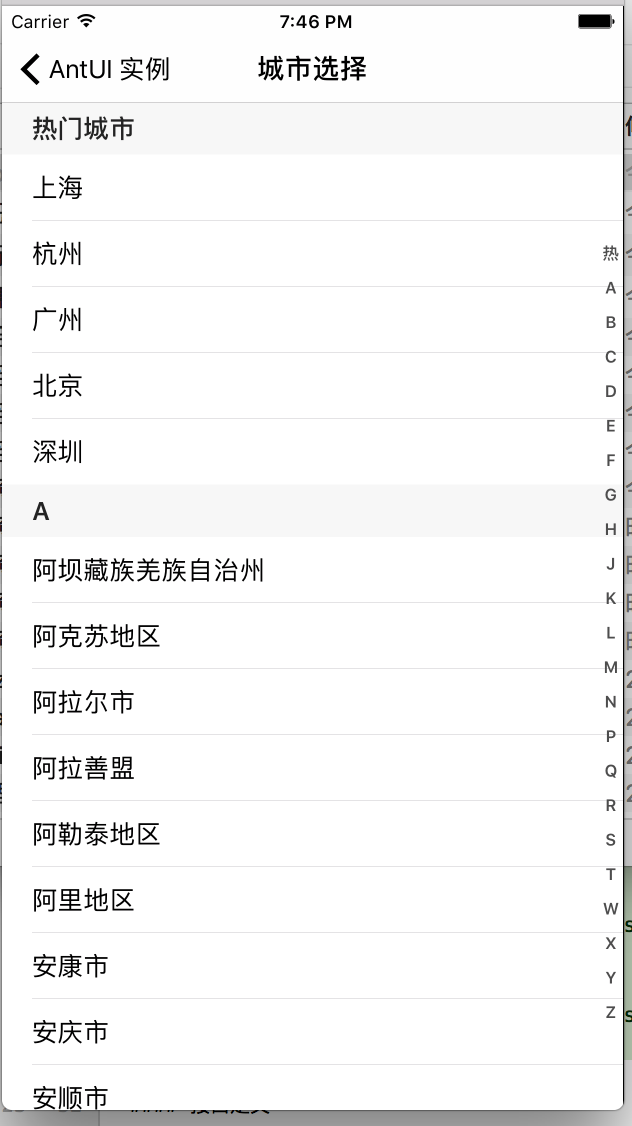AUBladeView 索引组件提供字母索引功能。在页面左侧或右侧的字母索引上,点击或者滑动到相应的字母,触发相应字母位置的事件。
效果图

接口说明
AUBladeView.h
//
// indexBar.h
//
#import <Foundation/Foundation.h>
#define kIndexSearchTitle @"搜"
@protocol AUBladeViewDelegate;
/*!
@class AUBladeView
@abstract UIView
@discussion 字母索引的 View
*/
@interface AUBladeView : UIView
- (id)init;
- (id)initWithFrame:(CGRect)frame;
- (void)clearIndex;
@property (nonatomic, weak) id<AUBladeViewDelegate> delegate;
@property (nonatomic, strong) UIColor *highlightedBackgroundColor;
@property (nonatomic, strong) UIColor *textColor;
@property (nonatomic, strong) UIFont *textFont;
@property (nonatomic, strong) NSArray * iconImageNames;
@property (nonatomic, strong) NSArray * iconTitles;
@property (nonatomic, assign) BOOL enableSearch;
@property (nonatomic, strong) NSArray * defaultIndexes;
- (void)updateIndexes;
@end
@protocol AUBladeViewDelegate<NSObject>
@optional
- (void)indexSelectionDidChange:(AUBladeView *)indexBar index:(NSInteger)index title:(NSString*)title;
@end代码示例
//
// bladeViewController.m
// AntUI
//
#import "bladeViewController.h"
#import "AUBladeView.h"
@interface bladeViewController ()<AUBladeViewDelegate,UITableViewDelegate,UITableViewDataSource>
@property (nonatomic,strong) AUBladeView * bladeView;
@property (nonatomic,strong) NSArray * sectionArr;
@property (nonatomic,strong) NSArray * mainDataIndexChar;
@property (nonatomic,strong) UITableView * tableView;
@end
@implementation bladeViewController
- (void)viewDidLoad {
[super viewDidLoad];
self.title = @"城市选择";
// Do any additional setup after loading the view.
self.tableView = [[UITableView alloc] initWithFrame:CGRectMake(0, 0, self.view.frame.size.width, self.view.frame.size.height) style:UITableViewStylePlain];
self.tableView.delegate = self;
self.tableView.dataSource = self;
[self.view addSubview:self.tableView];
self.bladeView = [[AUBladeView alloc] initWithFrame:CGRectMake(self.view.frame.size.width-16.0, 80, 16.0, self.view.bounds.size.height-60)];
self.bladeView.delegate = self;
NSString * plistStr = [[NSBundle mainBundle] pathForResource:@"APCommonUI_ForDemo.bundle/citydict" ofType:@"plist"];
NSDictionary * srcPlistDic = [NSDictionary dictionaryWithContentsOfFile:plistStr];
NSMutableArray * citysList = [[NSMutableArray alloc] initWithCapacity:27];
[citysList addObject:@{@"热门城市":@[@"上海",@"杭州",@"广州",@"北京",@"深圳"]}];
NSMutableArray * indexArrList = [[NSMutableArray alloc] initWithCapacity:27];
[indexArrList addObject:@"热"];
NSArray * keyList = [srcPlistDic allKeys];
NSArray * sortedList = [keyList sortedArrayUsingComparator:^NSComparisonResult(id _Nonnull obj1, id _Nonnull obj2) {
return [(NSString *)obj1 compare:obj2];
}];
[sortedList enumerateObjectsUsingBlock:^(id _Nonnull obj, NSUInteger idx, BOOL * _Nonnull stop) {
if (obj) {
NSDictionary * tmpDic = [[NSDictionary alloc] initWithObjectsAndKeys:[srcPlistDic objectForKey:obj],obj, nil];
[citysList addObject:tmpDic];
[indexArrList addObject:obj];
}
}];
self.sectionArr = citysList;
self.mainDataIndexChar = indexArrList;
// self.bladeView.iconTitles = secondaryIndexsTitles;
// self.bladeView.iconImageNames = secondaryIndexsIcons;
self.bladeView.defaultIndexes = self.mainDataIndexChar;
[self.bladeView updateIndexes];
[self.view addSubview:self.bladeView];
self.tableView.showsVerticalScrollIndicator = NO;
self.tableView.showsHorizontalScrollIndicator = NO ;
[self.view bringSubviewToFront:self.bladeView];
}
#pragma mark -----UITableViewDelegate
// Display customization
// Variable height support
- (CGFloat)tableView:(UITableView *)tableView heightForRowAtIndexPath:(NSIndexPath *)indexPath
{
return 44;
}// Use the estimatedHeight methods to quickly calcuate guessed values which will allow for fast load times of the table.
- (CGFloat)tableView:(UITableView *)tableView heightForHeaderInSection:(NSInteger)section
{
return 35;
}
#pragma mark -----UITableViewDataSource
- (NSInteger)tableView:(UITableView *)tableView numberOfRowsInSection:(NSInteger)section
{
NSDictionary * test = [self.sectionArr objectAtIndex:section] ;
NSArray * valueArr = [test objectForKey:([[test allKeys] firstObject])];
return [valueArr count];
}
- (nullable NSString *)tableView:(UITableView *)tableView titleForHeaderInSection:(NSInteger)section
{
NSDictionary * test = [self.sectionArr objectAtIndex:section] ;
return [[test allKeys] firstObject];
}
- (UITableViewCell *)tableView:(UITableView *)tableView cellForRowAtIndexPath:(NSIndexPath *)indexPath
{
UITableViewCell *cell = [tableView dequeueReusableCellWithIdentifier:@"BladeTableViewCell"];
if (!cell) {
cell = [[UITableViewCell alloc] initWithStyle:UITableViewCellStyleDefault reuseIdentifier:@"BladeTableViewCell"];
}
NSInteger section = [indexPath section];
NSInteger row = [indexPath row];
NSDictionary * test = [self.sectionArr objectAtIndex:section] ;
NSArray * valueArr = [test objectForKey:([[test allKeys] firstObject])];
NSString * text = [valueArr objectAtIndex:row];
cell.textLabel.text =text ;
return cell;
}
- (NSInteger)numberOfSectionsInTableView:(UITableView *)tableView
{
return [self.sectionArr count];
}// Default is 1 if not implemented
- (void)dealloc
{
self.tableView.delegate = nil;
self.tableView.dataSource = nil;
self.bladeView.delegate = nil;
self.bladeView = nil;
}
- (void)didReceiveMemoryWarning {
[super didReceiveMemoryWarning];
// Dispose of any resources that can be recreated.
}
/*
#pragma mark - Navigation
// In a storyboard-based application, you will often want to do a little preparation before navigation
- (void)prepareForSegue:(UIStoryboardSegue *)segue sender:(id)sender {
// Get the new view controller using [segue destinationViewController].
// Pass the selected object to the new view controller.
}
*/
#pragma mark ---- AUBladeViewDelegate
- (void)indexSelectionDidChange:(AUBladeView *)indexBar index:(NSInteger)index title:(NSString*)title
{
if (self.tableView){
NSInteger ret = 0;
if ([title isEqualToString:kIndexSearchTitle]){
[self.tableView scrollToRowAtIndexPath:[NSIndexPath indexPathForRow:0 inSection:ret]
atScrollPosition:UITableViewScrollPositionBottom
animated:NO];
return;
}
else {
ret = [self findIndexSection:title];
if (ret != NSNotFound) {
[self.tableView scrollToRowAtIndexPath:[NSIndexPath indexPathForRow:0 inSection:ret]
atScrollPosition:UITableViewScrollPositionTop
animated:NO];
}
}
}
}
- (NSInteger)findIndexSection:(NSString *)title {
NSInteger ret = NSNotFound;
int beginIndex = 0;
/*
以下为自定义的 section 计算规则
beginIndex += self.customSectionCount;
if (self.secondarySectionCount > 0 ){
for (NSInteger i = 0 ; i < [self.secondarySectionTitles count]; i++) {
NSString * secondaryTitle = [self.secondarySectionTitles objectOrNilAtIndex:i];
if ([secondaryTitle isEqualToString:title]) {
ret = beginIndex + i;
return ret;
}
}
beginIndex += self.secondarySectionCount;
}
*/
if ([self.mainDataIndexChar count] > 0){
for(NSInteger i = 0; i < [self.mainDataIndexChar count]; i++) {
NSString * indexChar = [self.mainDataIndexChar objectAtIndex:i];
if ([indexChar isEqualToString:title]) {
ret = i;
break;
}
}
}
if (ret != NSNotFound) {
ret = ret + beginIndex;
}
return ret;
}
@end该文章对您有帮助吗?